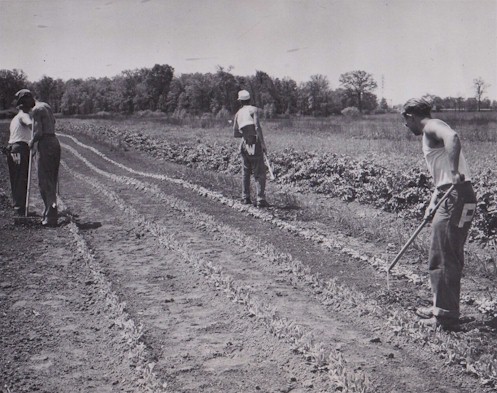When Potato Fields were Prisons: Unfree Farm Labor in McHenry during World War 2

German prisoners of war stationed at Fort Sheridan, ILL. raise their own vegetables on a four-acre tract of land at the fort where they have own camp including auto repair garage, and facilities for cabinetmaking, painting, electrical repairs and general labor. June 1, 1944 (Signal Corps photo)
Highland Park Historical Society will host “When Potato Fields: were Prisons: Unfree Farm Labor in Marengo, Illinois, During World War II ” presented by Samuel Klee, PhD candidate from Saint Louis University, at the Highland Park Library, 494 Laurel Avenue, at 2 p.m. on Sunday, April 5, 2020.
During World War II, some farmers in Marengo, Illinois negotiated with a large food corporation and federal agencies to make local farm fields into restricted, prison-like spaces. When the Curtiss Candy Company brought Japanese-Americans from the Tule Lake Internment Camp in California to cultivate and pick potatoes in 1943, the Marengo community struggled with the federal government and the candy company to eliminate the outsiders’ presence.
Weighing civic commitments, religious principles, and environmental necessities against racial fears, Marengo ultimately allowed Japanese-Americans to remain and work under surveillance and restriction. Later in 1943, they were joined by German prisoners of war who were formally incarcerated under military guard at nearby Camp Grant. Marengo’s wartime food system remained carceral, or prison-like, for the war’s duration.
Prison farms in a war for freedom may seem ironic, but agricultural communities across the country shared Marengo’s experience. In the Midwest, fields, packing sheds, and canneries received and used several unfree labor groups, including Japanese-Americans, German and Italian prisoners of war. While using federal programs, each receiving community negotiated their own forms of unfreedom on the land. Local and national newspapers, federal archives and published oral history interviews provided the basis for this presentation.
Samuel Klee is a Ph.D. candidate in American History at Saint Louis University. His dissertation, “Caging Cultivators: Carceral Labor Landscapes in American Agriculture during World War II,” examines farms that functioned like prisons for Japanese-Americans and European prisoners of war in the American Midwest. His teaching and research interests range from environmental world history and carceral state studies to education policy.
For further information, please contact the Highland Park Historical Society: 847.432.7090 or archives@highlandparkhistory.org. Admission is free.


